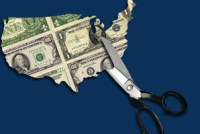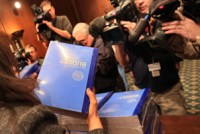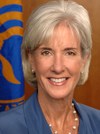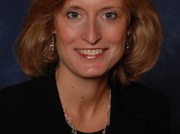Latest KFF Health News Stories
Wisconsin Union Battle Masks Medicaid Tensions
Democrats say Gov. Scott Walker’s proposal to tackle a two-year $3.6 billion deficit by making speedy changes in health care programs needs wider scrutiny.
When Care Is Split Between Medicare And Medicaid: KHN Interview With Melanie Bella
Melanie Bella heads the new federal office that seeks to help people whose coverage is often fragmented because they qualify for both programs and to save the government money by streamlining that coverage.
Sebelius Squad’s Mission: Medicaid Savings
The Obama administration is dispatching aides to states to offer advice on holding down spending on the program for the poor.
States Pushing Managed Long-Term Care For Elderly And Disabled Medicaid Patients
Some patient advocates, as well as the nursing home industry, object to using managed care for such vulnerable patients, but health plans say they can provide quality services while holding down costs.
Texas Presses For Money-Saving Medicaid Changes
The Lone Star State isn’t seeking to opt out of Medicaid anymore, but it’s joining other states in pressing Washington for more flexibility in running the program.
States Seeking To Cut Medicaid Rolls Get Some Help
Federal officials are walking a fine line trying to satisfy the demands of budget-strapped governors who want to cut their Medicaid programs.
Hardliners On Health Law: End It, Don’t Mend It
The conservative group FreedomWorks recommends a system of vouchers to replace Medicare, Medicaid and provisions of the new health law.
An Irresponsible Roll Of The Dice
The president chose to submit a profoundly unserious budget. There’s no entitlement reform to close the long-term fiscal gap. There’s no tax reform. There are some minor cuts to marginal programs for show. But, overall, it’s very much a business-as-usual budget, with a few new and expensive long-term commitments thrown in for good measure. It’s like the president and his team woke up after the mid-term election with a bad case of political amnesia.
Obama’s Medicare ‘Doc Fix’ Under Fire
In his 2012 budget, the president proposed a two-year, $54 billion solution to stop the scheduled cuts to doctors who treat Medicare patients. The plan draws on savings from a variety of sources, including states, drug makers
The nation’s leaders must slog through the complexities and ideologies of the current political landscape in order to craft solutions that will shore up the American safety net and protect its weakest citizens.
Health Programs On The Chopping Block As States Gird For Drop In Federal Aid
Hundreds of thousands of Americans are at risk of losing access to health services as states prepare to make yet another round of budget cuts.
States May Face Showdown With Feds Over Cutting Medicaid Rolls
Arizona has already asked for permission to trim back the program, and other states may follow as enhanced funding from Washington expires.
Health On The Hill Transcript: With State Fiscal Pressures Mounting, Medicaid Battle Looms
As state fiscal pressures mount, governors are asking Washington to allow them to reduce their Medicaid rolls, something that’s barred under the health care law. Democrats generally prefer to give the states more federal money to help with Medicaid costs, but House Republicans are unlikely to support that, citing deficit concerns.
Assessing Cuomo’s Efforts To Cut N.Y.’s Medicaid Budget
Courtney Burke of the Rockefeller Institute talks about New York’s new governor’s plans to tackle the public health insurance program.
Public Doesn’t Support Cuts To Health Care Programs
Poll finds high support for Medicare and Medicaid, complicating political strategies for election of 2012.
A New ‘Definition’ For Health Care Reform
Pursuing health reforms that transform current health insurance arrangements into aproaches based on defined contributions will set in motion a competitive dynamic from which all Americans would benefit.
Federal Funds Allowed States To Maintain Health Care For Poor Children
Even while dealing with crippling deficits, state Medicaid and CHIP programs used stimulus funds in 2010 to keep enrollment steady for children, a new report finds.
The Avastin Decision: A Rational Decision Or Rationing?
Sometimes the noisiest voices in the health overhaul debate don’t make a good faith effort to acknowledge important scientific or policy-oriented nuances in their arguments. It’s happening again in the wake of a controversial regulatory ruling about a cancer drug.
Health Care Battles To Surge Anew In 2011: Phil Galewitz
KHN reporters preview some of the big issues coming this year: KHN correspondent Phil Galewitz says there are questions about the effectiveness of states’ efforts to move Medicaid patients to managed care.
Long-Term Care: Another Tough Subject For The Next Round Of Reform
Democrats and Republicans may spend the next two years fighting about what to jettison or retain in the new health law. If these battles are resolved, we’ll be back to address another looming challenge: long-term care. It’s best that this happen sooner rather than later.















